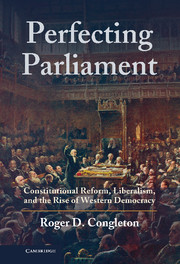Book contents
- Frontmatter
- Contents
- Preface
- 1 On the Origins of Western Democracy
- Part I Sharing Sovereignty
- 2 Team Production, Organization, and Governance
- 3 Organizational Governance in the Long Run
- 4 The Origins of Territorial Governance
- 5 Constitutional Exchange and Divided Governance
- 6 The Power of the Purse and Constitutional Reform
- 7 Suffrage without Democracy
- 8 Ideology, Interest Groups, and Adult Suffrage
- Part II Historical Evidence on Western Democratic Transitions
- Part III Analytical History as Social Science
- Appendix Methodological Approach, Limits, and Extensions
- References
- Index
2 - Team Production, Organization, and Governance
Published online by Cambridge University Press: 05 June 2012
- Frontmatter
- Contents
- Preface
- 1 On the Origins of Western Democracy
- Part I Sharing Sovereignty
- 2 Team Production, Organization, and Governance
- 3 Organizational Governance in the Long Run
- 4 The Origins of Territorial Governance
- 5 Constitutional Exchange and Divided Governance
- 6 The Power of the Purse and Constitutional Reform
- 7 Suffrage without Democracy
- 8 Ideology, Interest Groups, and Adult Suffrage
- Part II Historical Evidence on Western Democratic Transitions
- Part III Analytical History as Social Science
- Appendix Methodological Approach, Limits, and Extensions
- References
- Index
Summary
In the days before histories were recorded, there were few distinctions between governments and other organizations. Most were evidently familial and clan based. As agriculture emerged and people settled in particular places, the variety and size of organizations and governments tended to increase, and distinctions began to emerge between organizations that could impose rules only on their own members and those that could impose rules on persons outside their organizations. That more activities took place within formal organizations and within territories ruled by governments does not imply that all activities were organized from the top down, as in totalitarian states, nor do the distinctions between governments and other organizations imply that the procedures used by territorial governments had become completely different from those used in other organizations. More people were simply being organized to engage in more tasks because the advantages of formal organizations with artificial incentive systems had increased for both the leaders and members of organizations.
With such distant beginnings in mind, the analytical history of this book begins with an analysis of the emergence and evolution of formal organizations. All organizations share the property that they are formed to advance goals that can best be achieved by coordinating the efforts of more than one person. All organizations make decisions that focus the organization’s resources on particular activities and induce their members to function as more or less productive teams, rather than as unproductive assemblies of individual shirkers and rent seekers. It is these effects that make them organizations, rather than simply groups of unrelated persons, all doing their own thing. Hunting clubs, farm cooperatives, churches, commercial enterprises, pirate ships, and governments all select projects to undertake and provide internal incentives for undertaking them.
- Type
- Chapter
- Information
- Perfecting ParliamentConstitutional Reform, Liberalism, and the Rise of Western Democracy, pp. 27 - 54Publisher: Cambridge University PressPrint publication year: 2010



